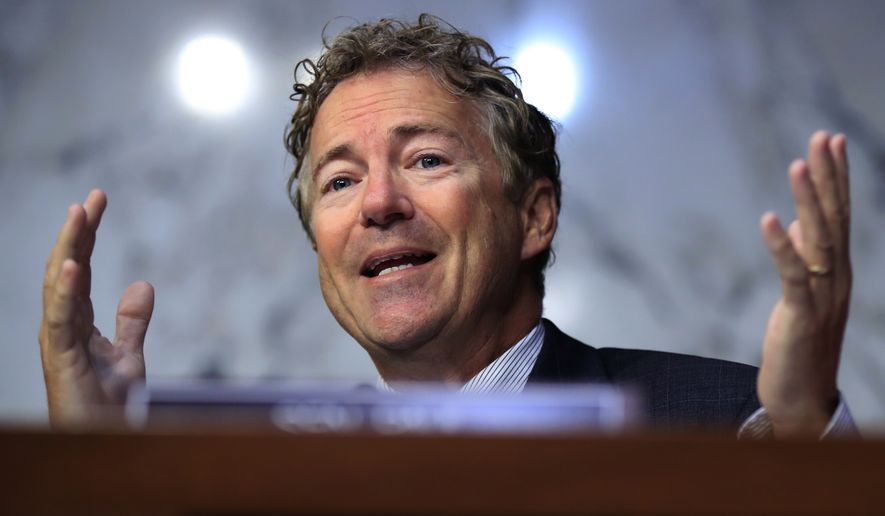Congressional leaders were racing another government shutdown clock Thursday night, searching for votes to approve a budget deal that could set the stage for the biggest spending increase in U.S. history.
At least a short shutdown — the second in less than a month — was likely, with Sen. Rand Paul vowing to force the debate into the early hours of Friday morning, past the midnight deadline when funding would expire.
Mr. Paul, Kentucky Republican, acknowledged he was fighting an uphill battle, but he said the public needed more time to process the massive bill, which clocked in at 652 pages and was dumped onto lawmakers’ desks late Wednesday night.
That meant little more than 24 hours to digest some $420 billion in guaranteed new spending, with the price tag possibly reaching $2.1 trillion over the next decade.
Congressional leaders, though, said time was of the essence. They were hoping to limit the shutdown and move on to other big issues.
“I am confident that no senator on either side of the aisle believes this is a perfect bill,” said Senate Majority Leader Mitch McConnell, Kentucky Republican. “But I’m also confident this is our best chance to begin rebuilding our military and make progress on issues directly affecting the American people.”
SEE ALSO: Rand Paul holds up Senate vote on budget deal, brief government shutdown possible
The Senate was expected to have the votes to pass the bill, with Mr. McConnell and his Democratic counterpart, Minority Leader Charles E. Schumer of New York, both on board.
But a bigger test loomed in the House, where Democratic leaders announced their opposition and where conservative Republicans said they would vote against a massive infusion of debt.
Rep. Scott Perry, Pennsylvania Republican, called the deal a budget-busting disgrace.
“We can’t continue to spend like there’s a magic money tree somewhere,” he said.
Republican leaders tried to cajole their members, saying they had the first chance in years to restock a military they said was eviscerated by cuts over the past six years.
“We owe it to the men and women who are risking their lives for us, to give them the best equipment, the best training, the best support that this nation can provide,” said House Armed Services Committee Chairman Mac Thornberry, Texas Republican. “This agreement begins to do that for the first time in a long time.”
Republican leaders said the price of more military spending was agreeing to Democrats’ demands for more domestic spending.
The bill includes an $80 billion boost in defense spending in 2018 and $85 billion more in 2019. Spending on the domestic side would increase by $63 billion in 2018 and $68 billion in 2019.
Within those amounts, the deal allocates $6 billion in anti-opioid grants and law enforcement money, $5.8 billion in child care block grants, $4 billion to rebuild veterans hospitals, $2 billion for the National Institutes of Health, and $20 billion to repair infrastructure.
The package also features a 13-month suspension of the debt ceiling to allow for more borrowing — taking the thorny issue off the table until after the midterm elections in November.
The bill also includes $72 billion in net emergency disaster relief money, $17 billion in tax breaks that were left out of last year’s tax cut bill and a repeal of the Obamacare board that was supposed to reel in Medicare spending. That repeal adds another $17 billion to the deficit.
The Committee for a Responsible Federal Budget said the deal would pave the way for $290 billion in new discretionary baseline spending this year and next.
Carried out through the rest of the 10-year budget window, and with added debt interest payments included, it could lead to $2.1 trillion in additional spending, the committee calculated.
By contrast, Mr. Obama’s stimulus package cost less than $850 billion, according to the final score from the Congressional Budget Office.
The Committee for a Responsible Federal Budget said the deficit in 2019 would be $1.2 trillion, nearly back to the record years set under Mr. Obama during and after the Great Recession.
“I ran for office because I was very critical of President Obama’s trillion-dollar deficits,” Mr. Paul said on the Senate floor. “Now we have Republicans hand in hand with Democrats offering us trillion-dollar deficits.”
House Democrats, meanwhile, were rallying against the bill not because of what was in it, but because of what was left out.
Spurred by immigrant rights activists, they demanded that the legislation include some guarantee of citizenship rights for millions of illegal immigrant Dreamers, who are staring at a March 5 deadline when the Deferred Action for Childhood Arrivals program is set to expire.
House Minority Leader Nancy Pelosi, California Democrat, held the floor for more than eight hours Wednesday telling stories of people who received DACA and went on to get educations or hold jobs.
On Thursday, she said that speech showed how serious she was about the issue.
“What it accomplished was, it again reminded the American people what our commitment is to our values,” Mrs. Pelosi said.
But Rep. Luis V. Gutierrez, Illinois Democrat, said Democrats need to show more than words.
“Democratic leadership said time and time again, ’We’re going to use our leverage. We’re going to make sure that the Dreamers are attached to a must-pass bill.’ That’s no longer the commitment.”
• David Sherfinski can be reached at dsherfinski@washingtontimes.com.




Please read our comment policy before commenting.